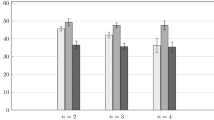Abstract
Many scholars, pundits, and reform advocates argue that more competitive elections are needed to produce policy outcomes that better reflect voter interests. We challenge this argument. Using a model of direct legislation elections, we prove that greater electoral competition is neither necessary nor sufficient for more responsive postelection policy outcomes. Instead, we find that more competition increases responsivenessonly if the additional competitors are both sympathetic to voter interests and sufficiently credible to affect voter behavior. If either condition fails to hold, then increasing competition will make votersworse off, if it affects them at all. We conclude that enhanced voter competence, and not more competition, is the key to greater responsiveness.
Similar content being viewed by others
References
California Commission on Campaign Financing (1992).Democracy by Initiative. Los Angeles: Center for Responsive Government.
Campbell, Angus, Converse, Philip E., Miller, Warren E., and Stokes, Donald E. (1960).The American Voter. New York: Wiley.
Crawford, Vincent, and Sobel, Joel (1982). Strategic information transmission.Econometrica 50: 1431–1451.
Ferejohn, John A., and Kuklinski, James H., eds. (1990).Information and Democratic Processes. Chicago: University of Illinois Press.
Kreps, David M., and Wilson, Robert (1982). Sequential equilibria.Econometrica 50: 863–894.
Lowenstein, Daniel H. (1982). Campaign spending and ballot propositions: Recent experience, public choice theory and the First Amendment.UCLA Law Review 29: 505–641.
Lupia, Arthur (1992). Busy voters, agenda control and the power of information.American Political Science Review 86: 390–404.
Lupia, Arthur (1994). Shortcuts versus encyclopedias: Information and voting behavior in California insurance reform elections.American Political Science Review 88: 63–76.
Lupia, Arthur, and McCubbins, Mathew D. (1994). Learning from oversight: Fire alarms and police patrols reconstructed.Journal of Law, Economics and Organization 10: 96–125.
Magelby, David B. (1984).Direct Legislation: Voting on Ballot Propositions in the United States. Baltimore: The Johns Hopkins University Press.
Petty, Richard E., and Cacioppo, John T. (1986).Communication and Persuasion: Central and Peripheral Routes to Attitude change. New York: Springer-Verlag.
Popkin, Samuel L. (1991),The Reasoning Voter: Communication and Persuasion in Presidential Campaigns. Chicago: University of Chicago Press.
Romer, Thomas, and Rosenthal, Howard (1978). Political resource allocation, controlled agendas, and the status quo.Public Choice 33: 27–44.
Rosenthal, Howard (1990). The setter model. In James M. Enelow and Melvin J. Hinich (eds.),Advances in the Spatial Theory of Voting, pp. 199–234. New York: Cambridge University Press.
Sen, Amartya K. (1970).Collective Choice and Social Welfare. San Francisco: Holden-Day.
Sniderman, Paul M., Brody, Richard A., and Tetlock, Philip E. (1991).Reasoning and Choice: Explorations in Political Psychology. Cambridge: Cambridge University Press.
Spence, Michael (1973). Job market signaling.Quarterly Journal of Economics 87: 355–374.
Author information
Authors and Affiliations
Rights and permissions
About this article
Cite this article
Gerber, E.R., Lupia, A. Campaign competition and policy responsiveness in direct legislation elections. Polit Behav 17, 287–306 (1995). https://doi.org/10.1007/BF01498598
Issue Date:
DOI: https://doi.org/10.1007/BF01498598




